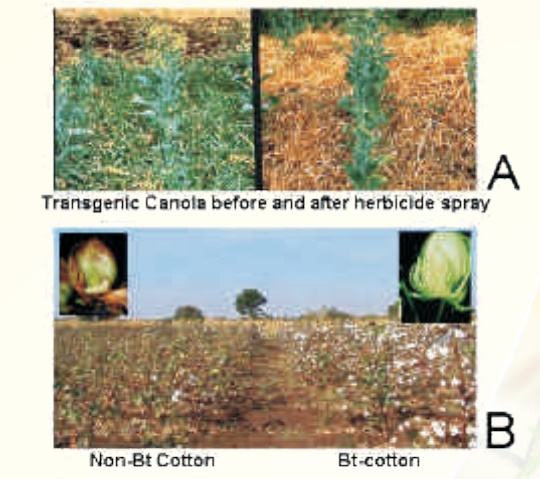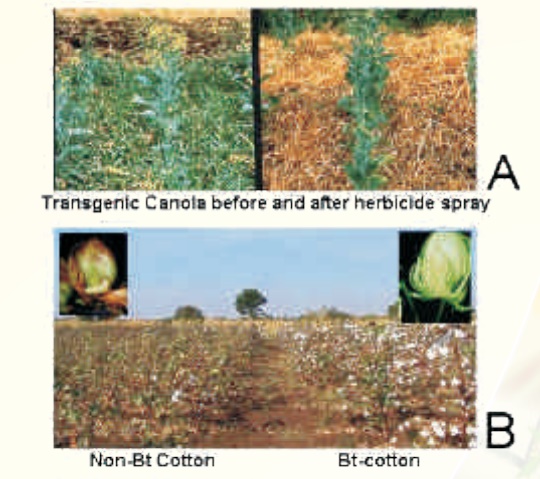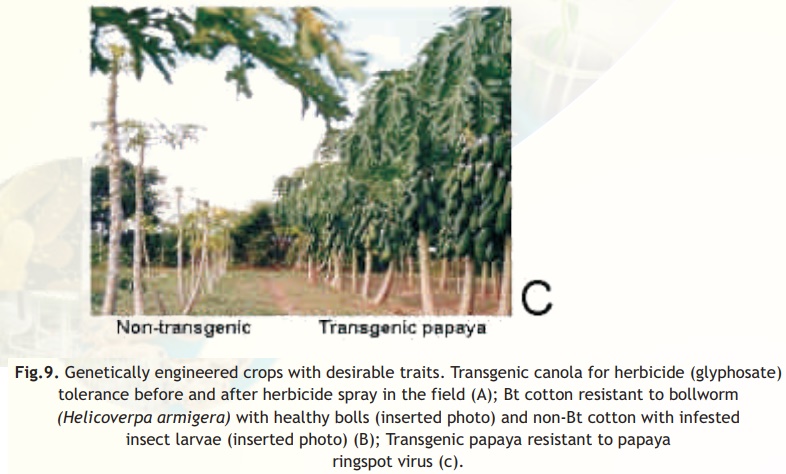Chapter: Biotechnology: Plant Cell Culture and Applications
Biotic and Abiotic stress tolerance

Stress tolerance
Crop plants are very productive under ideal cultural conditions, but ideal growing conditions rarely occur. Moreover, plants encounter both biotic (viral, bacterial, fungal pathogens, nematodes, insect pests and weeds) and abiotic (salinity, drought, extreme temperatures, nutrient deficiency, etc.) stresses and these stresses cause a colossal loss of crop yield and quality. The application of chemical and biological pesticides as well as the use of resistant varieties is only partial success and these have certain limitations. Therefore, newer and effective technologies are essential to meet the demand. In this context, biotechnological strategies can be used to create transgenic plants with increased resistance to diseases and pests as well as abiotic stresses.
Biotic stress tolerance
Herbicide tolerance: Weeds (plants growing where they are not wanted, e.g. Striga) decreasecrop yields and quality primarily by competing with crop plants for light, water and nutrients. Farmers apply herbicides/weedicides (e.g. glyphosate) for the eradication of weeds in the fields, but the main problem with this is the development of herbicide tolerance by weeds. Newer techniques, based on biotechnological tools, have been developed which are quite effective for weed management as well as in increasing the yields and income. There are several biotechnological strategies for weed control, but the most commonly employed approach is the over-production of herbicide target enzyme (usually in the chloroplast) in the plant, so that it becomes insensitive to the herbicide. The popular example for such an approach is the introduction of a modified gene from an Agrobacterium species that encodes for a resistant form of the herbicide target enzyme into crop plants for tolerance against the most extensively used herbicide glyphosate (sold as Roundup) and is effective against many weeds. Roundup Ready GM crop plants such as canola (Fig. 9A), soybean, corn and cotton tolerant to glyphosate has already been commercialised.


Pest resistance: All crop plants are affected by a variety of insects and nematodes, andsignificantly reduce their yield and quality. To minimize these losses (both food and money), farmers use the synthetic pesticides extensively which cause severe effects on human health and environment. The transgenic technology provides an alternative and innovative method to improve pest control management which are eco-friendly, effective, sustainable and beneficial in terms of yield. The first genes available for genetic engineering of crop plants for pest resistance were Cry genes (popularly known as Bt genes) from a bacterium Bacillus thuringiensis.
These are specific to particular group of insect pests, and are not harmful to useful insects like butter flies and silk warms. Transgenic crops (e.g. cotton, rice, maize, potato, tomato, brinjal, cauliflower, cabbage, etc.) with Bt genes have been developed for and such transgenic varieties proved effective in controlling the insect pests and it has been claimed worldwide that it has led to significant increase in yields, and dramatic reduction in pesticides’ use. Bt crops have already been commercialised in several countries. The most notable example is Bt cotton (which contains CryIAcgene) that is resistant to a notorious insect pest Bollworm and in the year 2002, Bt cottonwas adopted in India (Fig. 9B).
Disease resistance: Pathogens (viruses, fungi and bacteria) infect crop plants and drasticallyreduce their yield and quality. Globally, several diseases have caused havoc at several points of time in several countries. For instance, the great Irish famine resulted in great damage of potato crop due to the late blight disease caused by fungal pathogen. India has also experienced a famine in the form of Bengal famine due to destruction of rice caused by fungal pathogen. Thus, there is a great concern about the control of plant diseases. Traditionally, farmers apply chemical pesticides or use resistant crop varieties developed by the breeders, but these methods have certain limitations.The alternative and useful strategy is the creation of disease resistant transgenic crop plants by transfer of resistance genes from varied sources.
Virus resistance: There are several strategies for engineering plants for viral resistance, andthese utilizes the genes from virus itself (e.g. the viral coat protein gene). The virus-derived resistance has given promising results in a number of crop plants such as tobacco, tomato, potato, alfalfa and papaya. Some viral resistance transgenic plants like papaya resistant to papaya ring spot virus (Fig. 9C) have been commercialised in some countries.
Fungi and bacteria: Plants respond to pathogens by inducing a variety of defence responses likepathogenesis-related proteins (PR proteins), enzymes that degrade/destroy fungal cell wall, antifungal proteins and compounds, phytoalexins, etc. Several transgenic crop plants showing increased resistance to fungal pathogens are being raised with genes coding for the different compounds mentioned above.
Some of these strategies, particularly the genes that encode for phytoalexins and cell wall degrading enzymes were also used for producing bacterial resistant transgenic plants.
Abiotic stress tolerance
Plant growth and productivity are greatly affected by various environmental stresses/ abiotic stresses like high salinity and drought. Plant breeding efforts to produce abiotic stress tolerant plants while retaining high production is not very successful.
Plants have evolved many types of adaptations to cope with abiotic stress conditions like the production of the stress-related osmolytes like sugars (e.g. trihalose and fructans), sugar alcohols (e.g. mannitol) and amino acids (e.g. proline), glycine betaine, and certain proteins (e.g. antifreeze proteins). Transgenic plants have been developed which over-express the genes for one or more of the above mentioned compounds. Such plants have shown increased tolerance to environmental stresses.
Related Topics